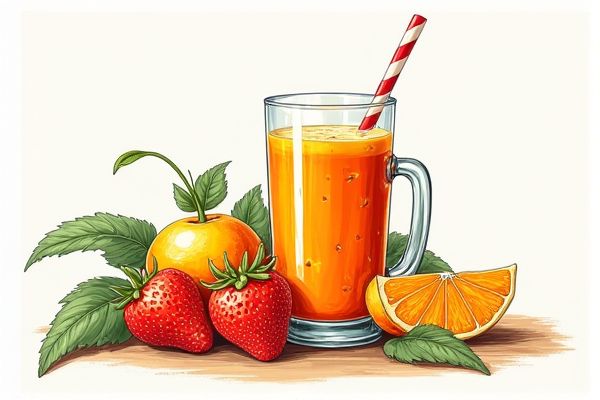As the demand for high-quality and ethically-sourced eggs continues to rise, consumers are becoming increasingly discerning about where their eggs come from. With concerns ranging from animal welfare to environmental impact, there is a plethora of brands that strive to meet these expectations with outstanding products. From organic and free-range options to certifications from reputable animal welfare organizations, various brands have established a reputation for delivering top-notch eggs. If you're on the hunt for eggs that align with your values and satisfy your taste buds, explore the list below to discover some of the best brands that hit the mark.

Illustration of eggs
Best brands of eggs in 2025
Eggland's Best
Eggland's Best is renowned as one of the top egg producers in the U.S., distinguished by its superior nutritional content and freshness. Their eggs contain six times more Vitamin D, more than double the Omega-3s, 10 times more Vitamin E, and 25% less saturated fat compared to ordinary eggs. The brand's proprietary all-vegetarian hen feed, which includes healthy grains, canola oil, and supplements like rice bran and alfalfa, contributes to these enhanced nutritional values. Independent studies have confirmed that Eggland's Best eggs stay fresher longer, with better egg white height, egg protein quality, and yolk color. As the #1 branded egg in the U.S., Eggland's Best conducts over 75,000 quality tests annually to ensure the highest standards. For more detailed information, visit Eggland's Best's official website.
Vital Farms
Vital Farms is a leading producer of pasture-raised eggs, founded in 2007 with a commitment to improving animal welfare and sustainable farming practices. The company has grown significantly, now working with over 300 small family farms and selling its products in more than 24,000 stores across the U.S. Since 2019, Vital Farms has more than doubled its employees and increased its revenue by over 2.5 times. In 2021, the company began using regenerative farming practices, earning a Regenified verification for four of its farms in 2023. Vital Farms' eggs are known for their higher nutritional content, including vitamins E and D, and omega-3 fatty acids. Learn more about how Vital Farms is breaking the egg game.
Happy Egg Co.
The Happy Egg Company is a leading American egg producer, renowned for its high standards in animal welfare and quality egg production. Established in 2012, the company achieved significant milestones, including sales of one million eggs by 2014 and relocation of its headquarters to Rogers, Arkansas in 2018. Certified by the American Humane Association, Happy Egg ensures its hens have access to more than eight acres of pasture, exceeding typical free-range standards. With a merger with Egg Innovations in 2024, the company now manages around 3.7 million hens, emphasizing free-range and pasture-raised practices. Happy Egg supports over 103 small family farms, providing superior care and contributing to local communities.
Pete and Gerry's
Pete and Gerry's is a leading producer of organic eggs, recognized for its commitment to humane and sustainable farming practices. The brand has achieved significant growth, with sales increasing over 30% annually for the last decade and more than 50% in the last two years. As the first egg producer to achieve Certified B-Corporation status, Pete and Gerry's ensures its hens have access to outdoor spaces, including winter gardens and pastures, aligning with Certified Humane standards. Their eggs are available in over 9,600 retail locations across the U.S. and are produced in partnership with nearly 20 family farms in the Northeast. The company processes over 30 million eggs annually, ensuring a high-quality and stress-free environment for the hens.
365 by Whole Foods Market
The 365 by Whole Foods Market brand is renowned for its stringent animal welfare standards, ensuring that all their eggs exceed basic cage-free requirements. Since 2004, Whole Foods has sold only cage-free eggs in their dairy cases, and by 2017, they launched their Animal Welfare Standards for Laying Hens, which include four distinct production systems: Cage-Free Plus, Outdoor Access, Pasture Raised, and Outdoor Living. These standards mandate amenities like perches, shelters, and outdoor access, with some systems requiring as much outdoor space as indoor space. The Pasture Raised label, for example, ensures hens have access to pasture all day, with sufficient cover and shade to accommodate at least 50% of the flock. Whole Foods audits each farm on a 15-month interval to ensure compliance with these standards. For more details, visit their egg standards page.
Organic Valley
Organic Valley is a leading producer of high-quality eggs, known for its stringent organic standards and humane treatment of hens. In 2021, Organic Valley's organic chicken farms, totaling about 1,170 farms, produced 544.5 million cartons of a dozen eggs. The brand exceeds the animal care requirements of the National Organic Standards, ensuring hens have access to fresh air, sunshine, and organic pasture. This approach results in healthier, happier hens and superior egg quality. Organic Valley's commitment to sustainability and animal welfare makes it a preferred choice for consumers seeking organic and free-range eggs.
Nellie's Free Range Eggs
Nellie's Free Range Eggs, a prominent brand in the egg industry, is known for its high-quality eggs produced without added hormones or antibiotics. The brand markets its eggs as coming from hens that can "peck, perch, and play on plenty of green grass," although a recent court decision highlighted concerns that the actual conditions may not align with consumer expectations of the term "free-range". Nellie's eggs are certified by Humane Farm Animal Care and are part of a trend where top egg producers are converting to cage-free housing, with intentions to house millions of hens in such conditions. Despite the controversy, Nellie's remains a popular choice for consumers seeking eggs from hens with outdoor access and a vegetarian diet. The brand's commitment to animal welfare and quality feed is reflected in their marketing and product details.
Trader Joe's
Trader Joe's is often perceived as a reputable brand for eggs, though the term "cage-free" used by the company does not necessarily imply humane treatment or ample space for the hens. Despite this, all Trader Joe's eggs are labeled as "cage-free," but this does not mean the hens have constant access to the outdoors or are free from overcrowding. In reality, most egg farms, including those supplying Trader Joe's, have overcrowded barns instead of cages. The eggs may still be produced under conditions that are not ideal for the hens' welfare. However, Trader Joe's does ensure that their eggs do not contain genetically modified organisms (GMOs), artificial colors, flavors, or preservatives.
Safeway’s Lucerne
Safeway's Lucerne brand stands out as a leader in egg production, particularly with its commitment to animal welfare. Since 2008, Safeway has collaborated with Humane Farm Animal Care (HFAC) to ensure all its cage-free and organic egg producers, including Lucerne Cage-Free, O-Organic, and Open Nature eggs, are Certified Humane. This initiative has significantly improved the lives of millions of laying hens, with Safeway being the first major retailer in the U.S. to implement such a requirement. By 2012, more than 15% of Safeway's overall egg sales were cage-free eggs, surpassing their initial goal of 12%. This commitment reflects Safeway's dedication to ethical and sustainable practices.
Kroger's Simple Truth Organic
Kroger's Simple Truth brand has set a new standard in egg production with the introduction of America's first carbon-neutral eggs, a collaboration with Kipster Farms. These eggs are produced in a closed-loop system that ensures high animal welfare standards, using cage-free, natural-like environments and feed made from surplus bakery products. The system is powered by rooftop solar panels and minimizes fine particle emissions, contributing to better air quality. By 2023, Kroger aimed to increase sales of shell eggs from cage-free or better housing systems to 51.9% of total egg revenue. This initiative aligns with Kroger's Zero Hunger | Zero Waste mission and their environmental, social, and governance strategy.
















Leave a Reply
Your email address will not be published.